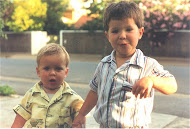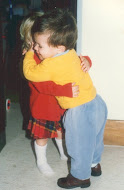set in stone for good, or for ill. Yes, it can be reinterpreted,
forgotten, forgiven or misremembered. But not changed in its 'having
happenedness'.
As for the future, we mostly believe in the future; in its openness
and possibilities. We believe, perhaps naively, that we can forge our
future. And for those of us who do believe that, then the future is
mostly not a threat. For Christians too the future holds hope and
confidence.
The past also has an ambiguous presence in the here and now. It is
presence because all that we are today is rooted in the past. Without
our past we are nothing now. So the past is overwhelmingly present
today. But at the same time the past is so thoroughly past and passed:
in a second it is gone and I cannot change it, go back to it, erase
it. And I cannot hold onto it, which of course is what we want to do
with Ben. Just to touch him again and to hear his voice. To have him
alive in the present and not have him as a past presence.
Yes we walk by faith. But we admit that our eternal hope of reuniting
with Ben is of a different order and only understood dimly from this
side of the veil. And right now - to confuse a metaphor - we'd rather
have the devil we knew in his tangible earthly body. We don't want him
as only past and future, we want him present too. Is that
faithlessness? I hope not. Just human anguish speaking out.
In the present he is not here. He is so gone. Untouchable. Yet so
present in all that we are and think and do. I still get confused
about how many people should be around the table when we are "all" at
home. This must be part of the offense of death - the paradox of the
presence/absence of the dead one. The unfathomable paradox that makes
us wrinkle our faces in pained perplexity and cry out "No, it can't
be!"
Chris
PS If you are a student of Heidegger or Augustine or Gadamer or just
the school of hard knocks, and you take offense at my theology or
philosophy, feel free to comment on these rambling thoughts as I try
and make sense of this part of the journey. Of course the blog owner
reserves the right to only publish comments that seem useful and
edifying!
From my reading today: Gadamer says, "That a proposition is more than
the representation of a given objective content means, above all, that
it belongs to the whole of a historical existence and that it is
contemporaneous with everything that makes its presence felt in it."
If that sounds complicated, try reading it slowly in the light of any
proposition that matters (like, "Ben died four months ago." or "God so
loved the world...") and you feel the weight of history and personal
experience coming into the present to fill out the enormous meaning of
propositions such as those.










1 comment:
the fine balance issue with theories is that they sometimes forget the impact of emotion, which is not only important but holds no place in morality or reason. i recently was the subject of an interview with somebody also doing her phd on Gadamer, and that became an interesting off centre call. love,fear, anxiety, faith,trust all affect physical responses without a logical cause.
Having said all that i have no doubt that the search helps us wade through these strange places...
Post a Comment